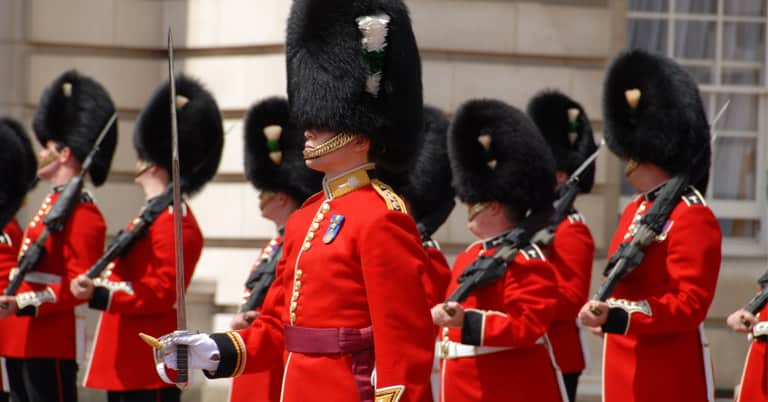The ceremony of the changing of the guard at Buckingham Palace is a major visitor attraction. It is one of London’s most famous ceremonies, with immaculately turned-out guards, stirring music and military precision drills combining to create a stunning spectacle.
The ceremony takes place when The Queen’s Guard hands over the responsibility of protecting Buckingham Palace and St James’s Palace to the New Guard. It normally takes place on Mondays, Wednesdays, Fridays and Sundays at 11am on the forecourt of Buckingham Palace.

© Sammy / Adobe Stock
It begins with a march by a detachment of the Old Guard, accompanied by bandsmen, from St James’s Palace, while a march of the New Guard, also led by a regimental band, sets off from Wellington Barracks. The ceremony takes around 45 minutes.
The Queen’s Guard is provided by Foot Guards from the Household Division, which has five regiments. They are particularly fascinating for visitors, thanks to their easily recognisable scarlet tunics and tall bearskin hats. Music is supplied by a corps of drums, the regimental band, or pipers on occasion.
Soldiers who take part in the changing of the guard are more than just figureheads. They are highly-trained infantry soldiers, who are skilled in a combat role, while also undertaking ceremonial duties.
Christopher Robin
Alan Alexander Milne, better known as Winnie the Pooh author AA Milne, also famously wrote a poem about the ceremony, which he simply called “Buckingham Palace”.
The author had created the stories of Winnie the Pooh, about the likeable anthropomorphic bear, for his son, Christopher Robin Milne. The boy in the stories was also called Christopher Robin and he had many adventures with his pal, Winnie the talking bear.
The real Christopher had named his toy teddy Winnie the Pooh, after seeing a black bear called Winnie at London Zoo. The orphaned wild baby bear had been rescued from a hunter by a Canadian veterinarian, Lieutenant Harry Colebourn, while on manoeuvres with the army during World War I.
Colebourn found her a home for life at London Zoo when he had to go to France with his regiment and she was much loved by the visitors, including young Christopher Robin.
Changing guard poem
Milne wrote the Buckingham Palace poem about Christopher Robin going to the changing of the guard ceremony in 1924, when his son was four years old. It was first published in a collection of his poems called When We Were Very Young.
The poem began with the famous lines, “They’re changing guard at Buckingham Palace – Christopher Robin went down with Alice.”
Over the years, some people speculated that the Alice in question may have been the character Alice in Wonderland, from the 19th century novel by Lewis Carroll. However, the character Alice in the poem was reportedly based on Christopher’s real-life nanny, who was employed to look after him.
His nanny’s real name was Olive Brockwell and she looked after Christopher until he was nine years old, at which time he was sent to boarding school. He always called her by the nickname, Nou. The poem went on to say, “Alice is marrying one of the guard – ‘A soldier’s life is terrible hard,’ said Alice.”
The poem ended with Christopher asking Alice, “Do you think the King knows all about me?” to which she replied, “Sure to, dear, but it’s time for tea!”
It’s unclear whether the poem was based on a real-life visit to see the changing of the guard. It was common for nannies to take out the children they looked after, so it would have been a possibility for Olive to have taken the young Christopher.
When he wrote his memoirs as an adult, Christopher dedicated them to his nanny, saying how he had “adored” her. He wrote, “Alice to millions, but Nou to me”. There was no evidence to suggest that Olive had married a Guardsman in real life, however, as the fictional character had in Milne’s poem.
Gramophone record
In 1941, Milne’s Buckingham Palace poem was made into a record, sung by child star Ann Stephens and set to music by the BBC’s Harold Fraser-Simson, an English composer of light music. Stephens was only nine years old when she recorded the song.
She also recorded other popular children’s songs of the era, including Teddy Bears’ Picnic. Her gramophone recordings were sold in aid of charity and in 1945, she visited Great Ormond Street Hospital, in London, for which she had raised £8,000.
Stephens’ recording remained a classic for many years and it often featured on the BBC Light Entertainment programme, Children’s Favourites. It was set to a military beat with a drum roll, which provided an oddly likeable backing to Stephens’ rather squeaky, childish vocals.
CONTACT H&H VAN HIRE
Watching changing of the guard
Watching the changing of the guard ceremony in London is free of charge and tickets aren’t required, although visitors are advised to arrive no later than 10.15am to ensure they have a good view. During the ceremony, police officers are always present to ensure the event runs safely and smoothly.
If you’re planning a trip to London to watch the changing of the guard ceremony, or any other ceremonial spectacles in the capital, why not hire a minibus from H&H Van Hire?
London minibus hire is a popular option for groups of travellers, as it’s convenient and cost-effective. Please contact us for further details of our nine, 14 and 17-seater minibuses.


